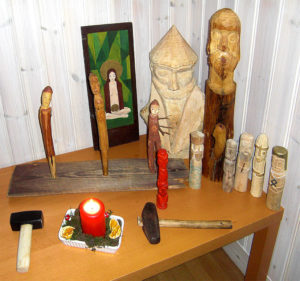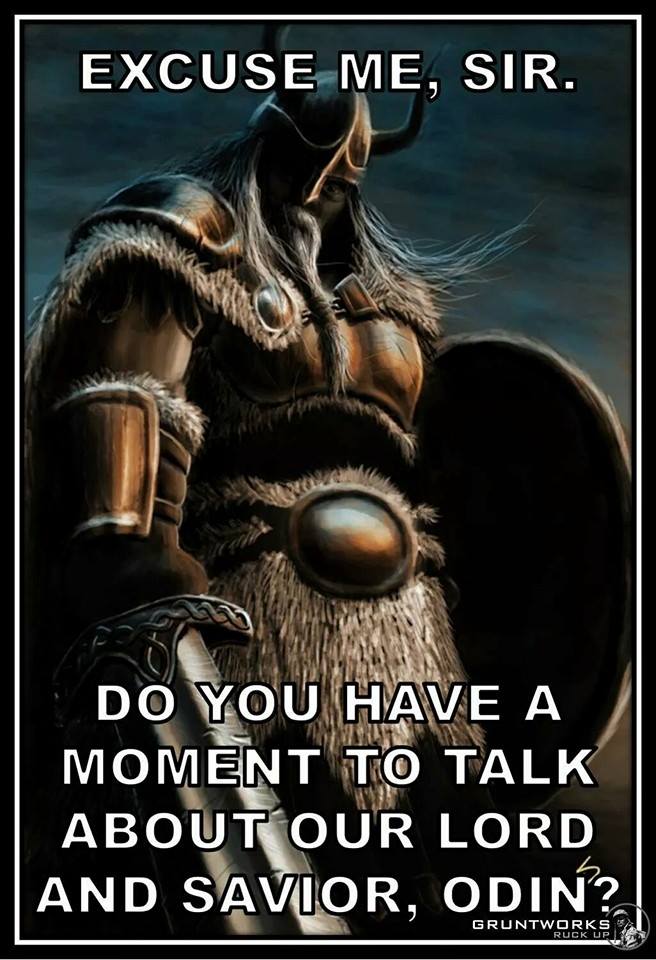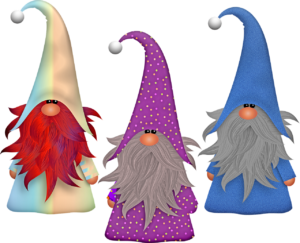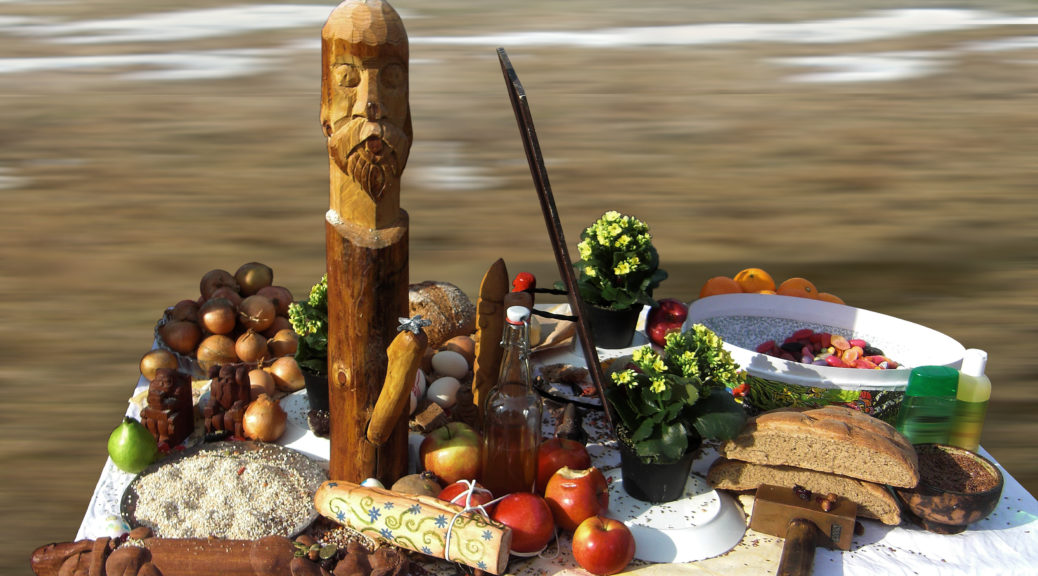Choosing a God or Goddess: Why the Gods You’ve Chosen Might Not be Right
Choosing a god
or goddess isn’t as easy as people sometimes make it. What’s the big deal, you say? You worship or honor Odin. Or maybe Freyja. Or Thor. But what if I told you that the god(s) or goddess(es) you’ve latched onto might not be the right gods or goddesses for you? This is especially true for the newcomers to Heathenry, but even us “old timers” can make the mistake. Let me explain.
Choosing a God in Heathenry
One of the great things about being a Heathen is that you don’t have to gravitate toward a particular god or goddess. Because we’re polytheistic, we have many different gods, ancestors, and wights we can choose from. Unlike other religions, you don’t have to choose a god or goddess. You can honor or worship them all. Nobody—at least not me—is telling you who calls to you. (Never mind those recon wankers; they’re not the Asa-popes they think they are.) At the same time, you can choose one or two whom your venerate more, while still maintaining good relations with the others. Or you can pick and choose from different pantheons, if you desire. There’s a historical precedence for that.
 Some Heathens in history incorporated other gods and goddesses into their worship as they learned of them from other tribes, kindreds, and even other ethnicities. The Vanir are probably the best known for this. Some scholars believe that our ancestors added another tribe’s gods and goddesses that became the Vanir. Even when Christianity came to our northern ancestors, many tried to incorporate Jesus as another god in the pantheon. Of course, that didn’t really work too well, but we can see by the Icelandic Cross, jewelry makers were catering to both sides for a while.
Some Heathens in history incorporated other gods and goddesses into their worship as they learned of them from other tribes, kindreds, and even other ethnicities. The Vanir are probably the best known for this. Some scholars believe that our ancestors added another tribe’s gods and goddesses that became the Vanir. Even when Christianity came to our northern ancestors, many tried to incorporate Jesus as another god in the pantheon. Of course, that didn’t really work too well, but we can see by the Icelandic Cross, jewelry makers were catering to both sides for a while.
Newbie Choices in Gods and Goddesses
 A lot of newbie Heathens tend to go with Odin, Thor, Freyja, or Loki, largely because of popular media. This is fine, and those gods are good within their own rights (although people might argue about Loki), however, that’s pretty much how far those new Heathens take it. They look at Odin as the All-Father in the same way that Christians look at Yahweh as “God the Father.” This comparison is laughable—or, maybe not, given the mercurial temperaments of both deities—when they are different in a number of ways. There are more gods and goddesses that may be far more influential and far more relevant in one’s life than the All-Father.
A lot of newbie Heathens tend to go with Odin, Thor, Freyja, or Loki, largely because of popular media. This is fine, and those gods are good within their own rights (although people might argue about Loki), however, that’s pretty much how far those new Heathens take it. They look at Odin as the All-Father in the same way that Christians look at Yahweh as “God the Father.” This comparison is laughable—or, maybe not, given the mercurial temperaments of both deities—when they are different in a number of ways. There are more gods and goddesses that may be far more influential and far more relevant in one’s life than the All-Father.
Odin isn’t all-mighty. Sure, he’s a god to be reckoned with if he’s angry at you, but if he hasn’t taken specific interest in you, he probably won’t care if you worship him or not. Same goes with our other gods. Most don’t bother when it comes to mortals. They have more godly things to deal with than our day-to-day whining and supplication. That being said, there are gods and goddesses who may take interest in you, but you may miss their calls if you’re always thinking about the more popular gods from modern media. Which is why, if you’re a newbie, you need to do your research about the other gods and goddesses.
Don’t Forget the Wights and Ancestors
Choosing a god is important, but so is recognizing that the gods aren’t the only supernatural creatures in our beliefs. The wights and ancestors tend to take more notice in us, because they’re often more local and/or personal than gods and goddesses are. Because they are closer to us than many of the gods, by making friends with them and honoring them we can often receive both aid and advice from them.
Who are your Ancestors?
Your ancestors are not only your parents and grandparents, but their parents, grandparents, great-grandparents, and so on. They are the people whose blood runs through your veins. Without them, you would not be alive today.
grandparents, great-grandparents, and so on. They are the people whose blood runs through your veins. Without them, you would not be alive today.
Ancestor veneration or ancestor worship (if you want to call it that) is a big part of Heathenry. Many Heathens gain strength from those who came before us. Some Heathens go through the whole genealogy thing too.
Now, granted, some of your ancestors were probably not people whom you should show respect to. If you come from an abusive home, for example, there’s probably no love loss there. You don’t have to respect or honor them. Look to your grandparents or some other ancestor in your line for help. At the same time, if you were adopted, don’t worry about who your ancestors are, especially if you don’t know your birth parents. Look at the ancestors of the people who adopted you and their family. You are part of that family now and you may find an ancestor among them who will be your mentor and helper in times of need.
Who are the Wights?
I’ve written about Wights recently, so I don’t need to go there. That being said, the local Wights are often the tutelary spirits of the land that are often familiar with you and your situation. Some will live in your house; many prefer being outdoors. They consist of many different types including Elves, Hidden Folk, and other spirits.
 The Wights can be very helpful or harmful, depending on their nature and how you treat them. There are rules to make the Nisse happy, for example. Nisse or Tomte like having porridge with milk and a pat of butter on either Winter Solstice or Christmas, depending on which lore you follow. If you skimp (no butter) or don’t leave the offering, they can cause havoc.
The Wights can be very helpful or harmful, depending on their nature and how you treat them. There are rules to make the Nisse happy, for example. Nisse or Tomte like having porridge with milk and a pat of butter on either Winter Solstice or Christmas, depending on which lore you follow. If you skimp (no butter) or don’t leave the offering, they can cause havoc.
Part of being a Heathen is making friends with these spirits and helping them, just as they might help you.
So, Where am I Going with This?
I am not telling you to abandon your worship of the popular gods and goddesses. Instead, I’m suggesting—especially if you’re a newcomer to Heathenry—to consider opening yourself to other gods as well as the ancestors and the Wights. At the very least, you will have a deeper understanding of your faith and what your ancestors believed in. And who knows? Maybe there are gods and goddesses you haven’t considered honoring who are actually closer to you than you knew. Choosing a god or goddess that is lesser known, or even a wight or ancestor, to honor or worship with your more popular gods may encourage a deeper and more profound relationship.
As always, let me know what you think in the comments.




